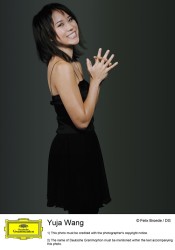 Switzerland Rossini, Tchaikovsky, Respighi: Orchestra dell’ Accademia di Santa Cecilia / Sir Antonio Pappano (conductor), Yuja Wang (piano), Tonhalle Zurich, 2.5.2017. (JR)
Switzerland Rossini, Tchaikovsky, Respighi: Orchestra dell’ Accademia di Santa Cecilia / Sir Antonio Pappano (conductor), Yuja Wang (piano), Tonhalle Zurich, 2.5.2017. (JR)

Rossini – Overture to The Siege of Corinth
Tchaikovsky – Piano Concerto No.1 Op.23
Respighi – Fountains of Rome and Pines of Rome
Sir Antonio Pappano brings his Roman orchestra, the Academy of Santa Cecilia, on tour to northern Europe, and started with a splendid concert in Zurich. Migros-Kulturprozent-Classics kindly and generously supports the Swiss part of their tour.
In 1826 Rossini re-worked his opera Maometti II which had only been a very modest success. He re-named it The Siege of Corinth, made it more suitable to a Parisian audience, and promptly became a star in both Paris and his native Italy. However, the opera and, in concert, its overture are seldom performed nowadays and we are indebted to Sir Antonio for reminding us of its existence. It does feature on his fairly recent CD of Rossini overtures, but in a league table of Rossini overtures, it would be in danger of being relegated, with William Tell, Barber of Seville, Thieving Magpie and The Italian Girl in Algiers all vying for the top spots.
The orchestra’s fine credentials were presented in the opening bars of the Rossini: crisp execution born of diligent rehearsal, an advantage of seeing an orchestra at the start of a tour. The “sprint à la Rossini” (as the programme note put it) was great fun and brought a smile to the face.
Yuja Wang was the star attraction of the first half of the concert and all eyes were on her as she entered, stage right, with most fans wondering which of her various stunning and figure-hugging outfits she might be wearing. It turned out to be a floor-length tight turquoise gown, split to the waist, but not from the waist down but waist up. Wang tottered onto the stage, slowly and inelegantly, having probably put the stilettos on just before coming onto the stage. That, for her, was the hardest part of her performance.
Tchaikovsky’s First Piano Concerto is something of a party piece for Wang. She has been playing it regularly since she shot to fame some years ago when she stood in for Martha Argerich and performed it under Charles Dutoit. Relentless pounding and manic tempi are by now the trade mark impressive details of her seemingly effortless technique – but that does not always tally with the score, as the opening bars of the Tchaikovsky foretold. Speed is not always appropriate even if it brings gasps from the audience. A Wang performance is certainly not for the purists, but the audience certainly loved it. Hopefully, after a few more years at the keyboard, she will become more musically mature. The final page of the score was also subject to a degree of improvisation. She says, incidentally, when she reaches 40 her skirts will get longer: only ten years to go! (At the CD signing after the concert, Wang slipped into something more comfortable; no not jeans and sneakers but a short sparkly tight dress and Jimmy Choos – or “stripper wear” as one American critic put it).
We enjoyed two encores: Schubert’s ‘Gretchen am Spinnrad’ arranged by Liszt and a Horowitz arrangement from Carmen. The audience whelped with delight.
Ottorino Respighi hailed from Bologna but, after learning his trade under Rimsky-Korsakov in St. Petersburg, settled in Rome in 1913 when appointed Professor of Composition at the Santa Cecilia Academy. The works The Fountains of Rome and The Pines of Rome brought him to international attention and were a great success; he used the profits to buy a villa, naming it “The Pines”.
Pappano merged the Fountains with the Pines so that one work led straight into the other; it does not quite work as the final movement of the Fountains is very much a Finale. In Pappano’s (batonless) hands, the orchestra sang their description of each fountain. The work was written for the orchestra and is core repertoire; all sections of the orchestra were simply splendid but I highlight principal clarinet, oboe and the dynamic Leader. At one stage I thought Pappano was conducting Rheingold as he magisterially controlled the raging waters. Pappano is best known as an opera conductor but was clearly very much at home here with this quasi-symphonic repertoire.
For the Pines Pappano had additional brass in the side balconies and almost brought the Tonhalle’s crumbling roof down when the Roman Army, accompanied by the Tonhalle’s massive organ, trundled along the Appian Way. Pappano did not want to add to the constructional damage and gave us a wistful Sibelius encore, Valse Triste. The jubilant audience stamped for more, so it was straight into the ‘Lone Ranger’ section of the William Tell overture, which is virtually (but not really) the Swiss National Anthem.
Pappano is quoted as saying, “I try to get the players (of the Santa Cecilia) to flaunt their italianità, which basically means a singing tone and warmth” and he has succeeded in doing that (although Pappano grew up in England, not in Italy, he says his parents were very Italian). When Pappano first became Music Director of the orchestra, its numbers were severely depleted; he had to emulate Sir Simon Rattle in Birmingham to ensure that vacancies were filled. The orchestra is now, by common consent and certainly on the strength of this concert, the only orchestra in Italy that can compare itself (very favourably indeed) with top orchestras internationally.
If you are tempted to see and hear this fine orchestra (and conductor) on its tour, here are the next tour dates and some of the venues:
Berne May 3, Geneva May 4, Lucerne (KKL) May 5, Lugano May 5, Amsterdam (Concertgebouw) May 9, Paris (Philharmonie) May 10, London May 11 (Royal Festival Hall) and Essen May 13.
John Rhodes
